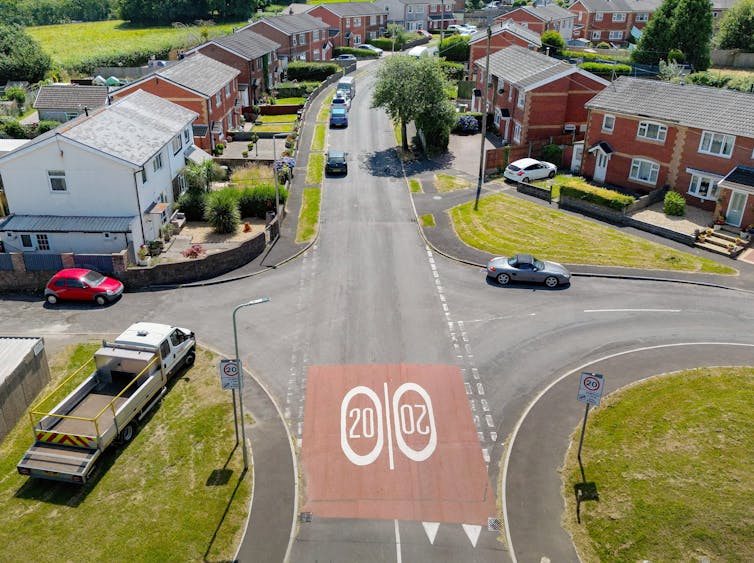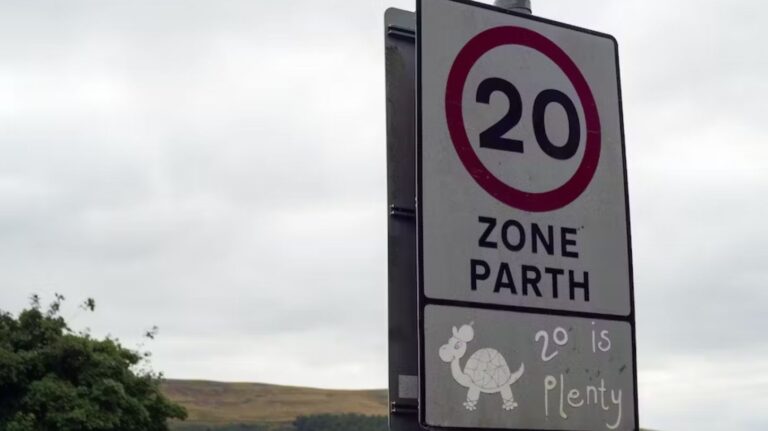The Welsh government wants to make residential roads safer and quieter but not everybody agrees with dropping the speed limit from 30mph to 20mph…
The default speed limit in residential areas in Wales was reduced from 30mph (48.3km/h) to 20mph (32.2km/h) at midnight on September 17. It makes Wales the first UK nation to adopt a 20mph default urban speed limit.
The new limit will apply to all “restricted” roads, which are roads in built-up areas with high levels of pedestrians. There are some exemptions and local authorities have been able to apply for certain roads to be kept at 30mph.
This change in the law has huge potential public health benefits, including decreasing the number of injuries and deaths from collisions, and may encourage more people to walk and cycle.
However, there is some opposition to the change, with concerns over journey times, additional costs to businesses in deliveries, uncertainties around its effect on vehicle emissions and the potential for increased frustration and road rage.
In bringing forward this change, the Welsh government has used the strapline “20mph. A bit slower but a whole lot better”, and has led the campaign with the promise of reducing collisions and saving lives. It says that in the time a car travelling at 20mph can stop, a car at 30mph would still be doing 24mph (38.6km/h). It goes on to suggest that streets and communities will be safer, meaning people will walk more, improving health and wellbeing.
Evidence suggests the Welsh government is broadly correct. Reducing the default speed limit to 20mph will reduce casualties, providing drivers with more time to react if things go wrong.
Following the implementation of 20mph limits in Edinburgh, for example, the number of collisions in one year fell by 40%. There were 23% fewer deaths and serious injuries were reduced by 33%.
Walking and cycling may increase too. We know that higher vehicle speeds are a barrier to walking and cycling, especially among older adults.
Opposition
Not everyone in Wales is happy about the drop to 20mph. Several petitions have attempted to stop the change, while the Welsh Conservatives oppose blanket reductions. Reports have also emerged of 20mph signs being defaced.
A common complaint is that journey times will be slower. But a UK government report in 2018 looked at 12 case studies in England where 20mph limits were implemented, concluding that journey times increased by only 3% in residential areas and 5% in city centres, adding less than a minute to a five-mile trip.
Also, as traffic flows are often more interrupted in urban areas – with frequent junctions and traffic lights, for example – a slight reduction in maximum permitted speeds may smooth out the traffic flow, reducing perceived delays.
Driver behaviour is, of course, a complex subject. Some drivers simply do not want to slow down and feel they have a right to drive fast. Meanwhile, other drivers feel the pressure to conform with other people’s behaviour, fitting in with the prevailing norms on the road.
Drivers’ opinions
Charles was involved in a qualitative study, published in 2014, that attempted to categorise drivers’ opinions to work out how we might change attitudes and behaviour using the “diffusion of innovation” model, which is a theory that seeks to explain how, why and at what rate new ideas and technology spread.
In the study, drivers were sorted into categories of support for 20mph speed limits based on their answers to a series of questions. One group of “champions” was wholly supportive of 20mph regardless of others around them, even if tailgated or flashed by other vehicles.
In contrast, another group defined as “pragmatists” were more aware of others’ behaviour and were influenced by it, feeling the pressure to speed up. Many in this group had little awareness of speed limits in general, driving much more to the conditions or as others were around them.
And the final group of “opponents” tended to be strongly against speed limits. This tended to be reflected by how they set their own speed limits according to conditions.
The study suggested that champions respond well to information about the benefits of 20mph limits. But pragmatists need to accept that 20mph limits are normal and supported by most other drivers.
We know from the study that there is support for 20mph but also some ambivalence, which can be overcome after a bedding in period.

The truth is that most people are not opposed to 20mph speed limits, but a sizeable minority are. Welsh government commissioned research suggests 80% were either slightly or strongly in favour of 20mph limits in 2021, but that this fell to 63% in 2022.
This is not uncommon, however, as people’s support for change tends to grow initially but then falls off the closer it gets to implementation. Eventually, people may come around to the idea.
But it needs a government willing to stand its ground when negative public opinion emerges just before implementation, as we are seeing now.
It is time we stopped accepting death and injury in the name of freedom of mobility. Default 20mph speed limits are a good start but they must be accompanied by driver education programmes and police enforcement to be effective. And, of course, non-motoring road users still need more pavements, cycle lanes, safe crossing points and efficient and affordable public transport options.![]()
This article is authored by Charles Musselwhite, professor of psychology at Aberystwyth University and Peter Merriman, professor of human geography at Aberystwyth University. This article is republished from The Conversation under a Creative Commons license. Read the original article.





